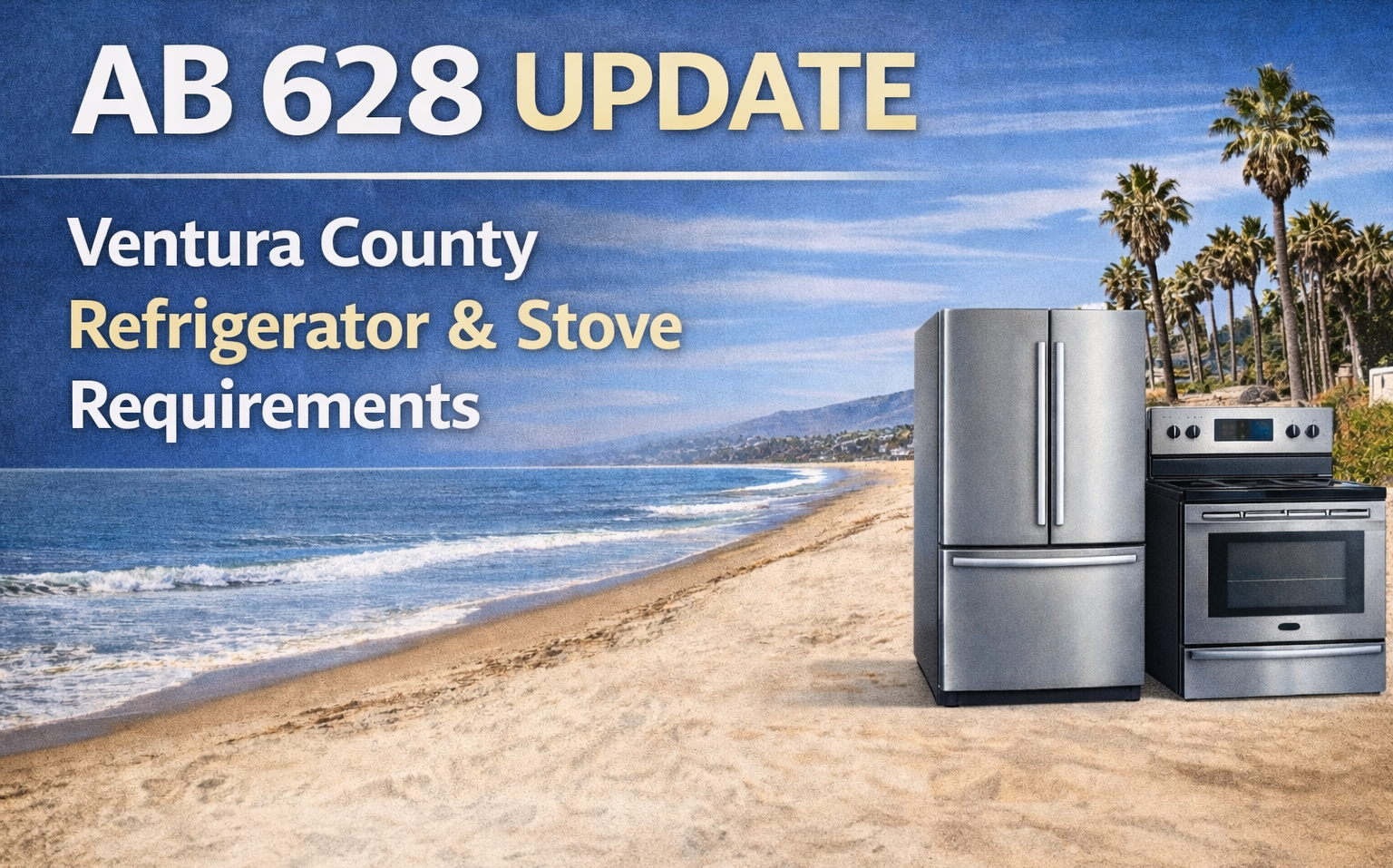New 2024 Landlord Laws
Landlords: 5 New 2024 Real Estate Laws

With 2024 approaching, Landlords need to be aware of new Real Estate Laws that affect the rental industry. You can view all new Real Estate Laws on the California Association of Realtors website.
Senate Bill 267 is codified as Government Code § 12955. Effective January 1, 2024.
Landlord must offer “ability to pay” in lieu of reliance on credit history and reports in assessing a tenant’s rental application when prospective tenant is receiving a government rent subsidy such as a Section 8 rental voucher.
SB 267 makes it unlawful, in instances where there is a government rent subsidy, for a landlord to use a person’s credit history as part of the application process for a rental accommodation without offering the applicant the option, at the applicant’s discretion, of providing lawful, verifiable alternative evidence of reasonable ability to pay the portion of the rent to be paid by the tenant, including, but not limited to, government benefit payments, pay records, and bank statements. When so offered, the applicant may elect to provide alternative evidence of reasonable ability to pay.
In which case the landlord must:
- Provide the applicant reasonable time to respond with that alternative evidence and
- Reasonably consider that alternative evidence in lieu of the person’s credit history in determining whether to offer the rental accommodation to the applicant.
Nonetheless, the landlord may still request information or documentation to verify employment, to request landlord references, or to verify the identity of a person.
Senate Bill 712 is codified as Civil Code 1940.41. Effective January 1, 2024.
SB 712 prohibits a landlord from prohibiting a tenant from owning personal micro mobility devices or from storing and recharging up to one personal micro mobility device in their dwelling unit for each person occupying the unit, subject to certain conditions and exceptions. Personal micro mobility devices are things like bicycles, scooters, hoverboards, skateboards, and their electric counterparts such as an e-bike or e-scooter.
SB 712 prevents landlords from prohibiting tenants from owning personal micro mobility devices and also prevents landlords from banning the storage and recharging of personal micro mobility devices in their dwelling units if the devices meet certain criteria as follows:
- They are not powered by an electric motor, or
- They comply with certain safety standards for e-bikes and e-scooters (see below), or
- Failing compliance with such safety standards, the tenant has insurance covering storage of the device within the unit.
Batteries for e-bikes should comply with either the UL 2849 standard, recognized by the United States Consumer Product Safety Commission, or the EN 15194 European Standard for electrically powered assisted cycles. E-scooters, on the other hand, need to align with the UL 2272 standard from the U.S. or the EN 17128 European Standard for personal light-electric vehicles.
However, landlords have the option to provide tenants with exterior “secure, long-term storage” for their devices. If such storage is offered without charge, landlords can prohibit the in-unit storage of these devices.
A landlord is not required to modify or approve a tenant’s request to modify a rental dwelling unit for the purpose of storing a micro mobility device inside of the dwelling unit. A landlord may prohibit repair or maintenance on batteries and motors of personal micro mobility devices within a dwelling unit. A landlord can require a tenant to store a personal micro mobility device in compliance with applicable fire code,
Assembly Bill 1418 is codified as Government Code § 53165.1. Effective January 1, 2024.
Prohibits local ordinances that penalize tenants and landlords for various types of law enforcement contacts, i.e., local “crime free” rental housing programs and ordinances.
Background: “Crime Free” rental housing programs and ordinances: What are they?
Crime-free ordinances have roots in the law enforcement community. Historically, they are police-sponsored programs that seek to create closer collaboration between police departments and landlords. Under the authority of crime-free housing ordinances, landlords are instructed or encouraged to refuse to rent to prospective tenants with a criminal history, which may include a history of arrests, with or without convictions, or any other indices that suggest a present risk to the rental property or the safety of other tenants.
However, such programs have been criticized as discriminatory in both conception and effect. The authors of AB 1317 have stated that, “there is no evidence that these policies do anything to reduce crime. Indeed, a closer look at these policies reveals they are generally motivated by racial animus and a desire to reverse demographic change in a given jurisdiction.”
Substance of AB 1418
This law prohibits cities and counties from enacting local policies that:
1) Require landlords to use criminal background checks. Make alleged criminal behavior without a felony conviction a basis to evict a tenant.
2) Require landlords to evict an entire household when a household member is convicted of a felony.
3) Define nuisance behavior to include police contact, police service calls, or anything else outside the scope of the existing state definition of a nuisance.
4) Require landlords to include lease provisions that provide a basis for eviction beyond those in existing state law.
The law also prohibits a local government from promulgating, enforcing or implementing an ordinance, rule, policy, program, or regulation affecting tenancy, that does any of the following:
- Imposes or threatens to impose a penalty against a resident, owner, tenant, landlord, or other person solely as a consequence of contact with a law enforcement agency.
- Requires or encourages a landlord to do, or imposes a penalty on a landlord for the failure to do, the following:
- Evict or penalize a tenant because of the tenant's association with another tenant or household member who has had contact with a law enforcement agency or has a criminal conviction.
- Evict or penalize a tenant because of the tenant's alleged unlawful conduct or arrest.
- Include a provision in a lease or rental agreement that provides a ground for eviction not provided by, or that is in conflict with, state or federal law.
- Perform a criminal background check of a tenant or a prospective tenant.
- Defines as a nuisance, contact with a law enforcement agency, request for emergency assistance, or an act or omission that does not constitute a nuisance under California law.
- Requires a tenant to obtain a certificate of occupancy as a condition of tenancy.
- Establishes, maintains, or promotes a registry of tenants for the purposes of discouraging a landlord from renting to a tenant on the registry or excluding a tenant on the registry from rental housing within the local government's jurisdiction.
Comment:
The prohibitions in this law are prohibitions against a local ordinance, rule, policy or program. They are not prohibitions against landlords themselves. For example, this law does not prevent a landlord from performing a criminal background check within the parameters of existing state and federal law. Nor does it prevent a landlord from evicting all tenants based on nuisance or the criminal activity of a single tenant.
Assembly Bill 12 is codified as Civil Code 1950.5. Effective July 1, 2024.
Landlords may collect no more than one month’s rent for either furnished or unfurnished units in addition to first month’s rent. There is an exception for small landlords, defined as a landlord who is a natural person or LLC and owns no more than two residential rental properties with no more than a total of four units offered for rent.
AB 12, beginning July 1, 2024, prohibits a landlord from demanding or receiving security for a rental agreement for residential property in an amount or value in excess of an amount equal to one month’s rent, regardless of whether the residential property is unfurnished or furnished, in addition to any rent for the first month paid on or before initial occupancy.
Exception for small landlords: A small landlord may demand or receive a deposit in an amount or value not in excess of 2 months’ rent, whether or not the unit is furnished, in addition to any rent for the first month, if the landlord (1) is a natural person or a limited liability corporation in which all members are natural persons and (2) owns no more than 2 residential rental properties that collectively include no more than 4 dwelling units offered for rent. The exception for small landlords includes family trusts.
This small landlord exception does not apply if the prospective tenant is a service member.
Landlords who currently hold a security deposit or demand or collect a security deposit in excess of one month’s rent prior to July 1, 2024, may continue to retain the security even if it is more than one month’s rent.
Assembly Bill 1620 is codified as Civil Code 1954.53. Effective January 1, 2024
Allows a jurisdiction with local rent control to require an owner of a rent-controlled unit to allow a tenant with a permanent physical disability to relocate to an available comparable or smaller unit located on an accessible floor of the property and retain their same rental rate.
AB 1620 creates a statutory process by which a locality with a rent control ordinance or charter could provide for unit swaps in certain situations where a disabled tenant is living in a rent-controlled unit, and the tenant would retain their current rent.
This process would only be available to tenants in rent-controlled units who
1) Have permanent physical mobility-related disabilities,
2) Live in units that are not served by an operational elevator,
3) Are not subject to eviction for nonpayment,
and
4) Where the jurisdiction has opted into AB 1620.
The procedure would be utilized as follows:
1) First the tenant would have to make a request for reasonable accommodation and engage in the interactive process established by 2 CCR § 12177 with their landlord and would have to provide a written request for a unit swap to an accessible unit.
2) Next, the interactive process negotiation would have to identify that the move to an accessible unit is necessary to accommodate the tenant's physical disability.
3) There would need to be an available comparable or smaller unit located on an accessible floor of the same building, or a comparable accessible unit owned by the same landlord on the same parcel (with at least four other units), that does not require renovation to comply with existing Health and Safety Code requirements
4) The local rent board or body with oversight of the rent control ordinance determines that the owner will continue to receive a fair rate of return for the new unit and
5) The tenant's original security deposit would be handled in accordance with existing law governing security deposits, meaning the landlord would be able to take out any legally permissible reimbursements for costs associated with cleaning or repairing the unit – exclusive of ordinary wear and tear – before returning the balance to the tenant, and the tenant would provide a new security deposit for the new unit.
For purposes of this paragraph, “comparable or smaller unit” means a dwelling or unit that has the same or less than the number of bedrooms and bathrooms, square footage, and parking spaces as the unit being vacated.
Further, if an accessible unit becomes available that the owner intends to move into or intends to move an immediate family member into, that unit would not be considered "available" under the bill's provisions.
Information in this blog is from California Association Of Realtors
https://www.car.org/en/riskmanagement/qa/New-Laws/2024-New-Laws





